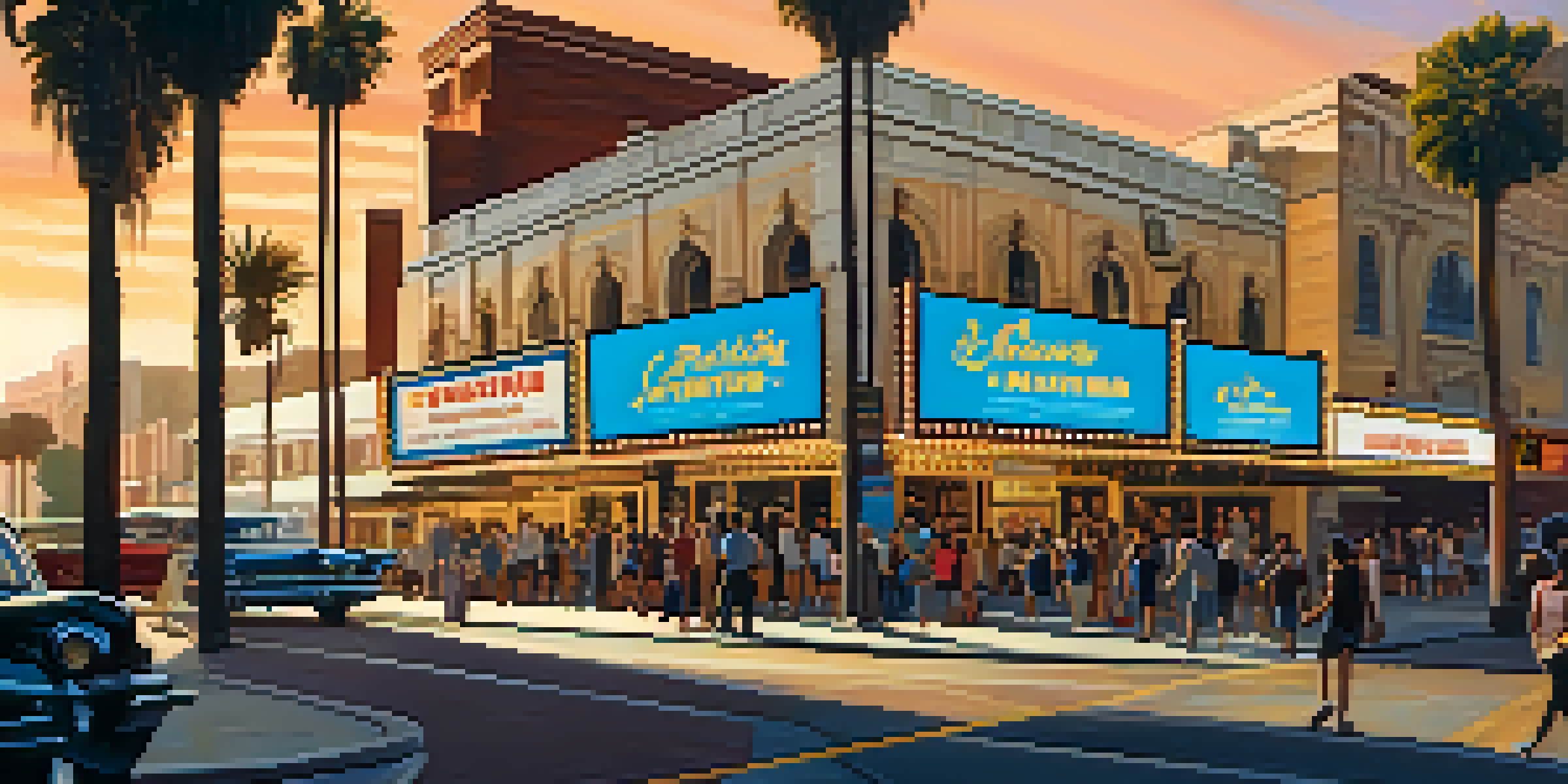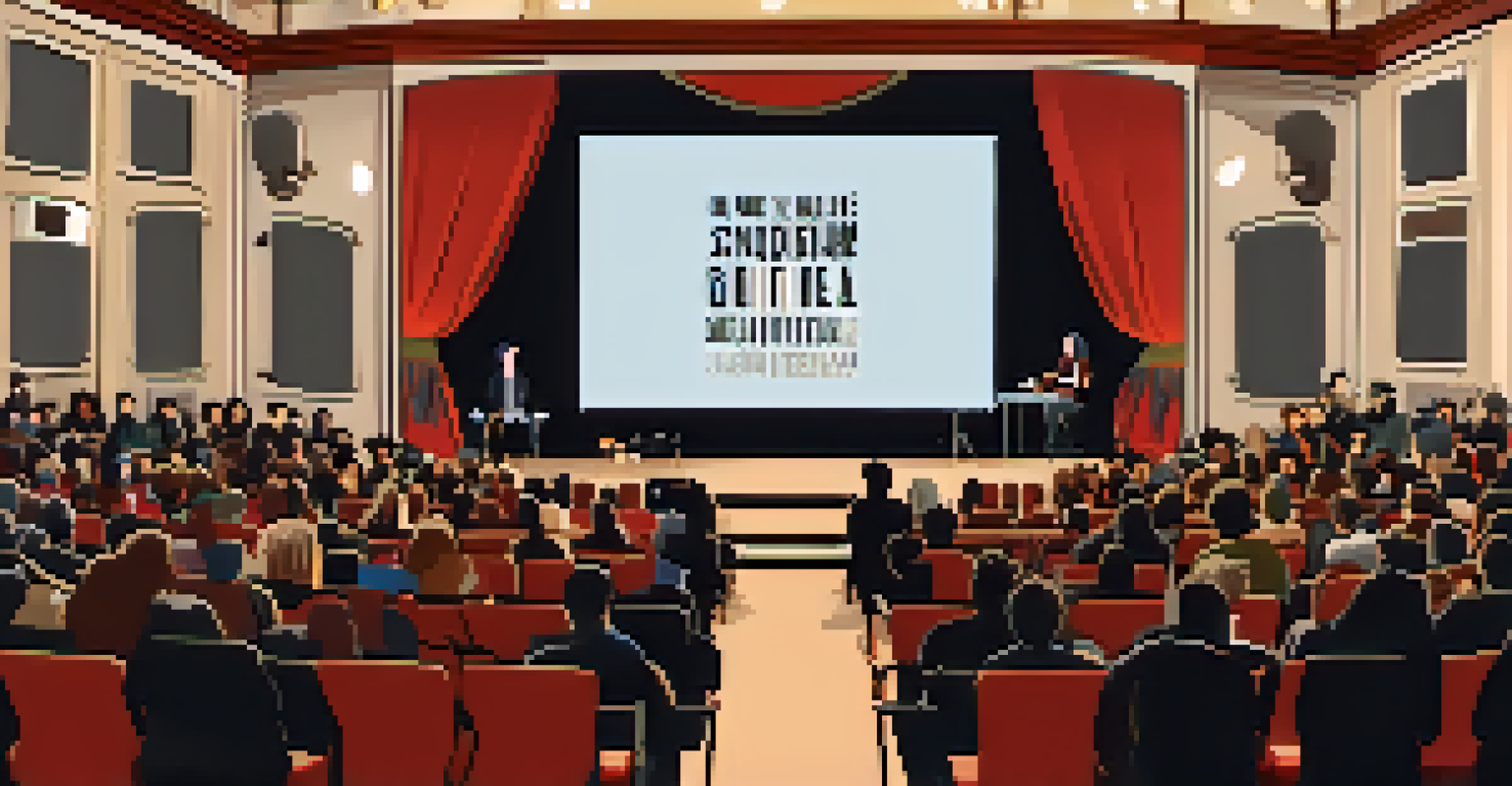The History of Film Festivals in Los Angeles: A Comprehensive Guide

The Birth of Film Festivals: A Historical Overview
Film festivals have a rich history, with the first significant event often credited to the Venice Film Festival in 1932. However, Los Angeles quickly emerged as a center for film, giving rise to its own festival culture. As Hollywood's influence grew, so did the need to showcase diverse cinematic voices and innovations.
Film festivals are the perfect opportunity to bring together filmmakers and audiences, creating a sense of community that continues to thrive today.
In the early days, these gatherings were less about glitz and glamour and more about promoting artistic expression. Filmmakers sought platforms to share their work, and festivals began to fill that niche. Los Angeles, with its vibrant cinema scene, became a natural hotspot for these events.
By the 1960s and 70s, the film festival landscape began to solidify, marking the beginning of a new era. Festivals like the Los Angeles Film Festival and AFI Fest brought together filmmakers and audiences, creating a sense of community that continues to thrive today.
Key Film Festivals in Los Angeles: An Overview
Los Angeles is home to some of the most prestigious film festivals in the world. Notably, the Sundance Film Festival, although primarily held in Utah, often features significant events in LA, attracting Hollywood's elite. Alongside this, the AFI Fest stands out as a premier destination for film enthusiasts.

Other notable festivals include the Los Angeles Film Festival and the Hollywood Film Festival, each showcasing a unique selection of films from around the globe. These festivals not only highlight new talent but also celebrate established filmmakers, creating a rich tapestry of cinematic experiences.
Film Festivals Boost Indie Cinema
Festivals in Los Angeles provide essential platforms for independent filmmakers, enhancing their visibility and fostering opportunities for collaboration.
Moreover, the festival scene in Los Angeles isn’t limited to just mainstream cinema. Events like the Los Angeles Asian Pacific Film Festival and the Outfest LGBTQ+ Film Festival shine a light on underrepresented voices, fostering diversity in storytelling.
The Role of Festivals in Promoting Independent Cinema
Film festivals have long been a lifeline for independent filmmakers, providing them with a platform to showcase their work. In Los Angeles, these events serve as a springboard for many indie projects that might otherwise go unnoticed. This is particularly important in an industry often dominated by blockbuster hits.
The greatest challenge for film festivals is to remain relevant in an ever-changing industry while still promoting the art of storytelling.
For many indie filmmakers, the exposure gained at festivals can lead to distribution deals and collaborations with larger studios. The buzz generated from a successful festival run can significantly boost a film's visibility, helping it reach wider audiences. This dynamic creates a cycle of opportunity for creative storytellers.
Additionally, festivals foster networking opportunities, allowing filmmakers to connect with investors, producers, and fellow creatives. The collaborative spirit of these events nurtures innovation, ensuring that fresh voices continue to emerge from the heart of Los Angeles.
Impact of Film Festivals on Local Culture and Economy
The economic impact of film festivals in Los Angeles is substantial, drawing thousands of visitors each year. These events not only generate revenue for local businesses but also create jobs in various sectors, from hospitality to event management. The influx of filmmakers and fans contributes to a vibrant cultural exchange.
Moreover, festivals play a vital role in shaping the cultural landscape of Los Angeles. They bring diverse stories and perspectives to the forefront, encouraging conversations around various social issues. This engagement enriches the community and fosters a deeper understanding of different cultures.
Cultural Impact of Film Festivals
Los Angeles film festivals not only stimulate the local economy but also enrich the community by showcasing diverse stories and fostering cultural exchange.
The sense of community that film festivals cultivate is palpable. Attendees often leave feeling inspired and connected, having experienced the power of storytelling in a shared space. This cultural enrichment is invaluable, making Los Angeles a hub for creativity and expression.
The Evolution of Audience Engagement at Festivals
Over the years, audience engagement at film festivals has transformed dramatically. Initially, these events were primarily about showcasing films, but they've evolved into interactive experiences. Today, many festivals incorporate Q&A sessions, panel discussions, and workshops, allowing attendees to engage with filmmakers and industry professionals.
This shift has made festivals more than just a viewing experience; they are now platforms for dialogue and education. Audiences can explore the themes and motivations behind films, deepening their appreciation for the art of filmmaking. This engagement fosters a sense of community among attendees.
Moreover, technology has played a significant role in enhancing audience experiences. Virtual screenings and online discussions have made festivals more accessible to a global audience, allowing people from all walks of life to partake in the cinematic celebration. This inclusivity is crucial for the future of film festivals.
Challenges Faced by Film Festivals in Los Angeles
Despite their success, film festivals in Los Angeles face several challenges. One significant issue is the financial strain on organizers, as many festivals rely on sponsorships and ticket sales to cover costs. With increasing competition and changing audience preferences, securing funding can be a daunting task.
Additionally, the rise of streaming platforms has altered how audiences consume films. While this shift has opened new avenues for storytelling, it also poses challenges for traditional film festivals. Many filmmakers are now opting for digital releases, potentially impacting festival attendance.
Future Trends in Film Festivals
The future of film festivals in Los Angeles will likely feature more immersive experiences and a continued focus on diversity and inclusion.
Moreover, maintaining relevance in a rapidly evolving industry requires festivals to continuously innovate. Adapting to new trends while staying true to their mission is crucial for survival. As Los Angeles continues to be a hub for film, festivals must navigate these challenges to thrive in the future.
Future Trends in Los Angeles Film Festivals
Looking ahead, the future of film festivals in Los Angeles is ripe with potential. As technology continues to advance, festivals are likely to incorporate more immersive experiences, such as virtual reality screenings and interactive installations. These innovations can enhance audience engagement and attract a new generation of film lovers.
Additionally, the emphasis on diversity and inclusion is expected to grow. Film festivals will likely continue to prioritize underrepresented voices, ensuring a wide range of stories and perspectives are showcased. This commitment to diversity enriches the festival experience and reflects the vibrant culture of Los Angeles.

Furthermore, as the landscape of cinema evolves, festivals will also adapt by embracing hybrid models. A combination of in-person and virtual events may become the norm, allowing for greater accessibility and wider reach. The future of film festivals in Los Angeles looks bright, with exciting possibilities on the horizon.